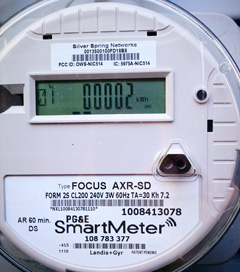Honest, paywall-free news is rare. Please support our boldly independent journalism with a donation of any size.
In response to heated opposition from consumers and activists, state regulators ruled on Wednesday that residential customers of California's PG&E utility company can choose not to have controversial smart meters installed in their homes, but it's going to cost them some extra fees.
Haven't heard of smart meters? Think of gas or electric meter combined with a smart phone, but there are no apps to download. Smart meters use wireless signals that automatically send energy usage information on regular intervals to the utility company. Utility companies in 25 states are working to integrate the new technology.
The Obama administration's 2009 stimulus package included $4.9 billion to develop a “smart” energy grid, a project the green-tech savvy state of California quickly jumped on board. Proponents claim the smart meters are as safe as other wireless devices and will help consumers and society save money and energy, but a growing grassroots movement claims smart meters pose privacy and health risks.
After hearing heated testimony from consumers, the California Public Utility Commission (PUC) ruled that smart meters will not be mandatory, but those who wish to opt out must pay a one-time fee of $75 and a monthly fee of $10. Residents in a program for low-income consumers will pay an initial $10 fee and $5 each month.
Smart meter opponents were seeking the right to opt out, but the fees angered some opponents who claim smart meters make them sick, and the fees amounted to extortion, according to The San Francisco Chronicle.
The fees cover costs the smart meters would have eliminated, such as sending workers to take readings.
Grassroots groups across the country, including Stop Smart Meters in California, are fighting smart meters tooth and nail. They dispute the potential benefits of smart meters and claim that it's risky to live with an ever-present wireless system that produces electromagnetic radiation.
Others are concerned about civil liberties issues and say that allowing utility companies to continuously monitor energy usage is an invasion of privacy.
According to the Stop Smart Meters web site, “thousands of people have complained of tinnitus, headaches, nausea, sleeplessness, heart arrhythmia, and other symptoms after a 'smart' meter was installed.” The web site tracks 49 local governments in California that are seeking a moratorium on their installation until more information is available.
As the world is quickly becoming more connected by wireless communications, scientists are racing to study potential health problems related to radiofrequency electromagnetic radiation, which is created by wireless networks, smart meters and cell phones.
Last year, World Health Organization (WHO) classified radiofrequency electromagnetic radiations as a “possible” carcinogen based on limited evidence that cell phones may cause certain types of brain cancer. There is no conclusive evidence that wireless devices are carcinogenic, but the WHO said scientists should continue to study potential health risks.
The American Board of Environmental Medicine, a group of scientists that first warned the public about Gulf War Syndrome and other environmental diseases, has called for a moratorium on smart meters until more research can be completed. In a letter to the California PUC, the group claimed that “the widespread, chronic, and essentially inescapable extremely-low frequency and radiofrequency exposure of everyone living near a smart meter” warrants a moratorium until medical concerns are addressed by further research.
We cannot always choose when we are exposed to wireless signals, but at least some energy consumers in California will not be forced to live with another source of constant electromagnetic radiation. As the smart grid spreads across America and Europe, smart meters – along with Wi-Fi in schools and cell phone towers – will continue to be a source of controversy until medical research catches up with technological innovation and the public's fears.
Trump is silencing political dissent. We appeal for your support.
Progressive nonprofits are the latest target caught in Trump’s crosshairs. With the aim of eliminating political opposition, Trump and his sycophants are working to curb government funding, constrain private foundations, and even cut tax-exempt status from organizations he dislikes.
We’re concerned, because Truthout is not immune to such bad-faith attacks.
We can only resist Trump’s attacks by cultivating a strong base of support. The right-wing mediasphere is funded comfortably by billionaire owners and venture capitalist philanthropists. At Truthout, we have you.
Truthout has launched a fundraiser, and we have only 24 hours left to raise $17,000. Please take a meaningful action in the fight against authoritarianism: make a one-time or monthly donation to Truthout. If you have the means, please dig deep.
